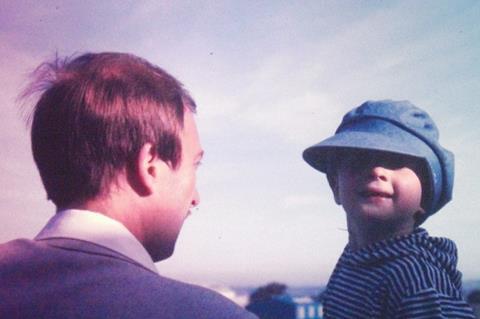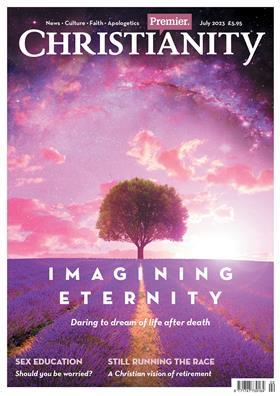When Michael J Tinker’s father was diagnosed with terminal cancer it took their family by surprise. But in the six short weeks between diagnosis and death, they experienced God drawing close like never before
It was 2021 and Dad was a year into retirement. Aged just 66 and after 38 years in church ministry, he was looking forward to the new adventures that lay ahead: the books to write, the churches to help plant, the time to spend with grandchildren.
He and Mum finally had a house of their own and were especially excited about the office in the converted garage. They were planning and dreaming about the golden years ahead. But those plans and dreams didn’t last long. The back pains Dad had been experiencing were more than back pains, and the reflux that was getting worse pointed to something sinister. After some investigations, my parents were given the news that everyone dreads: Dad had pancreatic cancer and had just a matter of months to live. It ended up being six weeks.
Six weeks. Such a short time.
The length of the school summer holidays. Half a term. Nothing really, when you think about it.
SUPERNATURAL PEACE
“Isaiah 43 is of great comfort and I am at peace. Maybe the last chapter will be the best yet?”
This was the text message from Dad to my brothers and I when he first received his diagnosis. I had long dreaded the time when he would no longer be here. The tears flowed and I found it hard to do anything in those early days. I was grieving even before Dad had died.
The veil between this world and the next is much thinner than we realise
And yet, strangely, I shared his sense of peace – after all, this is what a life following Jesus is leading to – that moment when we step through the door from this world to be with the one we have longed to see. I know Dad didn’t relish the journey to that door, nor did he want to leave us, but when you’ve clung to the gospel most of your life and you’re facing the prospect of seeing Jesus, faith comes into its own. There is peace.
I visited Dad as soon as I could. We went to a café and began to talk about that “last chapter”. As we walked back to his earthly house, we talked about our eternal home. And we talked more over the coming days and weeks, on the phone, sat in the living room, picking up a takeaway. We started to imagine what it would be like to walk on that new earth together.
After all, what else could we do but imagine?
For some, imagination is an activity to be left to children, or even to be avoided. Sadly, this can be especially true among evangelicals. After all, we’re people of the Word! We value truth. Imagination is about making stuff up and we need to stay well clear of all that…don’t we?
But as Dad and I delved deeper into the things of eternity, we discovered that imagination was precisely the vehicle we needed – to take us to places we had never been and yet longed to go. In fact, I’d suggest that’s what faith really is.
Dad’s vision of eternal life was becoming sharper by the day, almost in inverse proportion to how his body was failing
Hebrews 11:1 says faith is “confidence in what we hope for and assurance about what we do not see”. There is so much beyond our current experience, and yet essential to our walk with Christ. Imagination is the God-given tool that bridges the divide between what we know and what we haven’t yet experienced. If our imagination is biblically saturated, far from being a flight of fancy, it actually leads to a deeper understanding and love of Jesus.
Behind the scenes
One day, Dad pointed out the role of imagination in faith while reading 2 Kings 6. In the story, Elisha and his servant are surrounded by the Aramean army who are intent on capturing Elisha. It’s pretty terrifying – at least that’s how the servant feels. All he can see is an army encamped all around them. Elisha, on the other hand, can see something different. His immediate experience tells him they are doomed, but his faith-filled imagination tells him otherwise. Based on what he knows of his sovereign God, he is able to discern what is really going on, just behind the veil. All it takes is a small step of imagination.
It’s going to take divine intervention for his servant to understand this, however, so Elisha prays that God would open his eyes. When Elisha’s prayer is answered, we are told the servant sees horses and chariots of fire surrounding them.
As Dad and I reflected on this passage, we started to see that the veil between this world and the next is much thinner than we realise, as it was for Elisha. It’s only our lack of sight – or imagination – that stops us comprehending that.

The more familiar story of the thief on the cross (Luke 23:39-43) also illustrates this – and is one of the most category-defying stories in scripture. If there ever was an argument for salvation by grace alone, this is it. But what’s even more remarkable is that, in among all the chaos and confusion of that day, there are only two people who can see clearly – and they’re both impaled on instruments of torture.
Jesus obviously knows what is happening beyond the blood, suffering and shame that can be seen with the human eye. He knows of the weight of sin he is carrying in order to give us freedom and life. He knows of the resurrection glory to come. The other person who sees this is more surprising. A criminal, sentenced to death, sees Jesus not as a man in shame or defeat, but as a king who will come in glory. The man asks Jesus to remember him when he appears in his kingdom and Jesus explains that what awaits is even greater. The man’s imagination is lifted beyond the horrors of what is happening to them physically, to what awaits them beyond.
Stepping through the veil
Dad’s vision of Christ and eternal life was also becoming clearer and sharper by the day, almost in inverse proportion to how his body was failing. He was experiencing the outward “wasting away” but the inward renewing described in 2 Corinthians 4:16. He talked to me of how God was prising his fingers from this world. In another text message, he said that God was “stripping away the dross”. The pain increased, but so did his love for Jesus and his desire to be with him.
Imagination is faith joining the dots. It is faith in what we know of God that makes it possible to imagine what will come next. Dad had cultivated a biblical imagination – one that was steeped in scripture – and so when he was faced with this new, unknown situation, there was a wealth of ‘known’ truths to draw upon.

On the evening of the 22 November 2021, Dad was listening to David Suchet’s recording of the Bible, which Mum said they had started at 1 John. She had fallen asleep by the time they reached Revelation and, sometime early in the morning when she awoke, the reading had finished and Dad had stepped through the veil into paradise.
Our conversations with Dad ended that November evening. But I know that, one day, they will be resumed. My ruminations on imagination and eternity have continued.
Artists, by their nature, are inquisitive beings, always asking questions; watching and listening, seeking to understand the stories of those around them. As a songwriter, that’s how I process the world. I had been taking notes of the things Dad said as we chatted and, now that I could no longer go to him, I went to those notes and started to write.
But there was one lingering question we hadn’t discussed. What happens to all of our experiences here, both good and bad, when we get there? Surely, if God has left me here after taking Dad, there must be some purpose, some experience I need to go through that will somehow make eternity even better. I kept finding myself drawn back to something that seems so significant in the Bible and yet is only mentioned a couple of times – the tree of life.
Scars and healing
The tree of life is talked about both at the start and end of the Bible (Genesis 3 and Revelation 22). We’re told it’s for the “healing of the nations” (Revelation 22:2) but what does this mean? Will we need healing in eternity?
As I have thought about it, I have become convinced that we will carry our earthly experiences like scars into the new creation. After all, the resurrected Jesus appeared to his disciples still bearing the scars of his crucifixion (John 20:27). Sometimes we talk as if heaven will somehow obliterate any memory of our experiences here, as if blissful ignorance is how we are healed. But that just doesn’t make sense.
Why would God allow us to endure all the struggles of life if he’s just going to obliterate any sign of them when we’re with him? Doesn’t it make more sense to imagine that everything here is preparing us for there? If that is so, carrying our scars into eternity makes sense, in the same way that Jesus went through the cross to come out the other side in resurrected glory, and bears the marks of that in his body. What Dad went through, even the suffering of those final days, matters. What we go through as we’re left behind, mourning that loss, matters, too.
So, I don’t think the scars will be obliterated in the light of eternity, but neither will they hurt. One of the most common cries of this life is: “Why, God?” In eternity, we will finally understand the wounds, just as the disciples understood Jesus’ scars and suffering afresh in light of the resurrection.
And perhaps that’s where the tree of life comes in. Perhaps we will go to that tree ready for our scars to be transformed, to be understood; for all the tears and laughter of this life to be seen in the light of eternity.

Imagine going to the tree, hands outstretched as if to receive communion, but instead of looking up to see your pastor’s face, you see the Father, his smile broad and arms outstretched. Imagine holding on to him like Mary held Jesus in the garden, not being told to let go but being able to hold on and on and on.
Do I know it’ll be exactly like that? No.
But I can imagine.
This article was the cover story in July’s issue of Premier Christianity. Subscribe for half price



































No comments yet